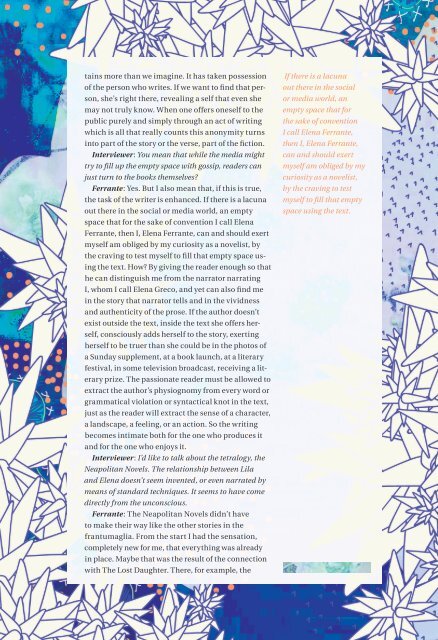magazine_final_online
Create successful ePaper yourself
Turn your PDF publications into a flip-book with our unique Google optimized e-Paper software.
tains more than we imagine. It has taken possession<br />
of the person who writes. If we want to find that person,<br />
she’s right there, revealing a self that even she<br />
may not truly know. When one offers oneself to the<br />
public purely and simply through an act of writing<br />
which is all that really counts this anonymity turns<br />
into part of the story or the verse, part of the fiction.<br />
Interviewer: You mean that while the media might<br />
try to fill up the empty space with gossip, readers can<br />
just turn to the books themselves?<br />
Ferrante: Yes. But I also mean that, if this is true,<br />
the task of the writer is enhanced. If there is a lacuna<br />
out there in the social or media world, an empty<br />
space that for the sake of convention I call Elena<br />
Ferrante, then I, Elena Ferrante, can and should exert<br />
myself am obliged by my curiosity as a novelist, by<br />
the craving to test myself to fill that empty space using<br />
the text. How? By giving the reader enough so that<br />
he can distinguish me from the narrator narrating<br />
I, whom I call Elena Greco, and yet can also find me<br />
in the story that narrator tells and in the vividness<br />
and authenticity of the prose. If the author doesn’t<br />
exist outside the text, inside the text she offers herself,<br />
consciously adds herself to the story, exerting<br />
herself to be truer than she could be in the photos of<br />
a Sunday supplement, at a book launch, at a literary<br />
festival, in some television broadcast, receiving a literary<br />
prize. The passionate reader must be allowed to<br />
extract the author’s physiognomy from every word or<br />
grammatical violation or syntactical knot in the text,<br />
just as the reader will extract the sense of a character,<br />
a landscape, a feeling, or an action. So the writing<br />
becomes intimate both for the one who produces it<br />
and for the one who enjoys it.<br />
Interviewer: I’d like to talk about the tetralogy, the<br />
Neapolitan Novels. The relationship between Lila<br />
and Elena doesn’t seem invented, or even narrated by<br />
means of standard techniques. It seems to have come<br />
directly from the unconscious.<br />
Ferrante: The Neapolitan Novels didn’t have<br />
to make their way like the other stories in the<br />
frantumaglia. From the start I had the sensation,<br />
completely new for me, that everything was already<br />
in place. Maybe that was the result of the connection<br />
with The Lost Daughter. There, for example, the<br />
If there is a lacuna<br />
out there in the social<br />
or media world, an<br />
empty space that for<br />
the sake of convention<br />
I call Elena Ferrante,<br />
then I, Elena Ferrante,<br />
can and should exert<br />
myself am obliged by my<br />
curiosity as a novelist,<br />
by the craving to test<br />
myself to fill that empty<br />
space using the text.


